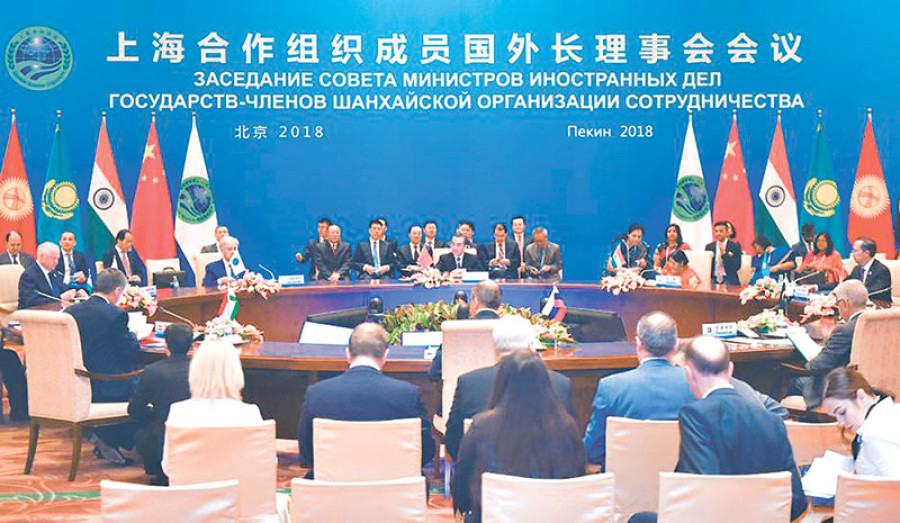Opinion
The Asian game
Nepal should create plans instead of trying to know one ally through the other’s eyes
Atul K Thakur
At the outset of the 18th Shanghai Cooperation Organisation (SCO) summit, the host Chinese President Xi Jinping described the presence of Indian Prime Minister Narendra Modi and Pakistani President Mamnoon Hussain as being of historic significance, and announced that the entry of India and Pakistan into the SCO would bolster its strength. The Chinese president called for the pursuit of a common, comprehensive, cooperative and sustainable security. He also stressed the need to reject the Cold War mentality and come together to achieve security for all. However, he selectively failed to mention whether India would continue to keep the same hostile stand against China’s Belt and Road Initiative (BRI) after the SCO summit.
Strike a balance
What an irony that India has been a mute spectator to the South Asian Association for Regional Cooperation’s (Saarc) free fall, and now has shared the SCO summit with Pakistan, making its own past policies and strategies subservient to a directionless ploy aimed at dealing with China and bringing down the curtain on instances like the Doklam standoff. This was the second meeting between the leaderships of India and China after the April 28 informal summit in Wuhan. China’s envoy to India Luo Zhaohui posted on Twitter that this was the 14th meeting between the two leaders in four years.
As a take-home package, two agreements were signed: a memorandum of understanding between China’s Ministry of Water Resources and India’s Ministry of Water Resources, River Development and Ganga Rejuvenation enabling China to share flood season data with India. Noticeably, data was not shared last year, with China making simple excuses and without citing the strained terms as the sole reason.
What is striking after the two-day SCO summit is that India opted not to sign the Qingdao joint declaration that referred to the BRI. This gave enough signals about the complication that is going to endure in India-China relations. In contrast, the full members gave their firm affirmation, making this project a crucial determinant for regional power politics. As per the Qingdao declaration, “The Republic of Kazakhstan, the Kyrgyz Republic, the Islamic Republic of Pakistan, the Russian Federation, the Republic of Tajikistan and the Republic of Uzbekistan reaffirm their support for the ‘Belt and Road Initiative’ proposed by China and affirm that all parties should implement the ‘Belt and Road Initiative’ to promote the ‘Belt and Road Initiative’.”
Noticeably, the BRI was the only point where the names of the approving countries were individually mentioned instead of using the term ‘member states’. Clearly, China had made a point with it, and that was to show the stakeholders how it still trusts its old policy of controlled aggression and maintaining thoroughly the ‘self-interest’ on strategic and economic matters. Widely circulated in the Indian media, India’s positioning in Singapore and Qingdao was seen as a foreign policy shift that had a leaning towards maritime and continental sides.
Today, when China is certainly a power to reckon with in both strategic and economic domains, India’s preparedness should be in a manner where it can deal with the former and pursue its own policies unhesitatingly in the neighbourhood without reaching a conflict stage. Remarkably, both India and China are in a phase where their larger interests should inspire the micro-management of policies in the region and the world. For sure, China is no longer in a position to compromise with its grown-up stature and is evidently losing no chance to negate its old charm in maintaining a ‘low profile’.
More opportunities than cost
Also, the Chinese establishment knows well how crucial its existential positioning is, and accordingly, is looking to make new alliances and offload burdens like Pakistan. Beyond the China-Pakistan Economic Corridor (CPEC), China has little interest in Pakistan’s capabilities as a regional power. The CPEC and BRI are not a simple scheme of things, and at no cost can they be taken merely as road projects to improve connectivity across borders. For Pakistan, it’s blissful to come under the expansionist canopy of China rather than getting overlooked and having to carry its wounded system forward in a resourceless state. Its China plan is clearly a survival ploy, no moral angle can be established for going deep into it.
However, the cases of India and Nepal are strikingly different. While India is an equal power in the region and is formidably placed in the world to counter China’s twinge of conscience, its continuing policy of restraint should be seen as a mature stand to not disturb the much watched Asian game. By giving economic integration a fair chance, India and China can give a well-deserved rest to their huge reservoir of arms and currency.
Nepal must come to terms with the changing situation and understand that it offers more opportunities than problems in maintaining fairly functional relations with both India and China. And the heart of the matter should remain that it needs infrastructure, a sustainable base for economic growth and a system that ensures inclusive growth. Nepal should believe in ‘realism’, and accordingly, make implementable plans without wasting precious time in trying to know one ally through the other’s eyes. It needs to explore new opportunities without neglecting its ‘self-interest’!
Rana is a former finance minister of Nepal and an economist, and Thakur is a New Delhi-based columnist




 9.7°C Kathmandu
9.7°C Kathmandu










